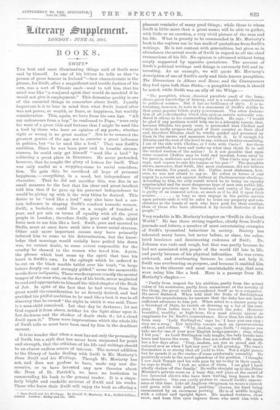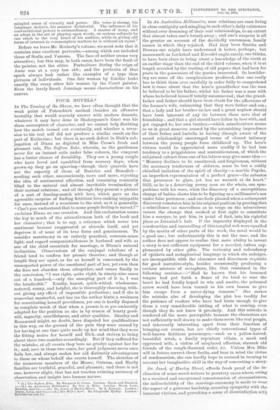BOOKS.
SWIFT.*
THE best and most illuminating things said of Swift were said by himself. In one of his letters he tells us that "a person of great honour in Ireland. "—how characteristic is the phrase, for Swift, after a magnificent and terrific fashion of his own, was a sort of Titanic snob—used to tell him that his mind was like "a conjured spirit that would do mischief if he would not give it employment." This demoniac quality is one of the essential things to remember about Swift. Equally important is it to bear in mind that what Swift lusted after was not power, or wealth, or fame, or happiness, but worldly consideration. This, again, we have from his own lips. "All my endeavours from a boy," he confessed to Pope, "were only for want of a great title and fortune that I might be used like a lord by those who have an opinion of my parts ; whether right or wrong is no great matter." Not to be counted the greatest genius of the age, not to exercise a great influence in politics, but "to be used like a lord." That was Swift's ambition. Since he was born poor and in humble circum- stances, he could only get himself "used like a lord" by achieving a great place in literature. He never pretended, however, that he sought the glory of letters for itself. That was only useful as a stepping-stone to social considera- tion. To gain this, he sacrificed all hope of personal happiness, — everything, in a word, but independence of character. That he did not sacrifice this, was due in no small measure to the fact that his clear and great intellect told him that if he gave up his personal independence be would be giving up with it the very thing he desired. This desire to be "used like a lord" may also have had a cer- tain influence in shaping Swift's conduct towards women. Swift, a bachelor, could live on a couple of hundred a year, and yet mix on terms a equality with all the great people in London ; therefore Swift, poor and single, might force men to use him like a lord. Swift, poor and married to Stella., must at once have sunk into a lower social stratum. Other and more important causes may have primarily induced him to come to his determination, but the know- ledge that marriage would socially have pulled him down was, we cannot doubt, to some extent responsible for the cruelty he showed to the women who loved him. Again, the phrase which best sums up the spirit that tore his heart is Swift's own. In the epitaph which he ordered to be cut on the black marble tablet over his tomb, "in large letters deeply cut and strongly gilded," occur the memorable words &Eva indignatio. Those words express exactly the mental temper of the man who, on the day of his birth, never neglected to read and appropriate to himself the third chapter of the Book of Job. In spite of the fact that he had wrung from the great world the consideration he so fiercely desired, and had gratified his pitiful ambition to be used like a lord, it was in all sincerity that he cursed "the night in which it was said, There is it man-child conceived. Let that day be darkness; let not God regard it from above, neither let the light shine upon it. Let darkness and the shadow of death stain it ; let a cloud dwell upon it." These were imprecations which the whole life of Swift tells us must have been used by him in the deadliest earnest.
It is no wonder that when a man has not only the personality of Swift, but a style that has never been surpassed for point and strength, that the criticism of his life and writings should be an almost endless source of interest. The newest addition to the library of books dealing with Swift is Mr. Moriarty's Dean Swift and his Writings. Though Mr. Moriarty has not, and does not profess to have, made any new dis- coveries, or to have invented any new theories about the Dean of St. Patrick's, we have no hesitation in commending his book to the general reader. It is a singu- larly bright and readable account of Swift and his works. Those who know their Swift will enjoy the book as offering a
* Doan Stailt and his Writings. By Gerald P. Moriarty, B.A., Balliol College, Oxford. London : Seeley and Co, 1893.
pleasant reminder of many good things; while those to whom Swift is little more than a great name, will be able to gather, with little or no exertion, a very vivid picture of the man and his life. What is greatly to be commended in Mr. Moriarty's book is the copious use he has made of quotations from Swift's writings. He is not content with generalities, but gives us in abundance theactual words of Swift in regard to all the chief transactions of his life. No opinion is advanced without being amply supported by apposite quotations. The account of Swift's political writings and doings is extremely full and in- teresting. As an example, we will quote Mr. Moriarty's
description of one of Swift's early and little-known pamphlets, The Dissensions in Athens and Rome, and the Consequences they had upon both those States,—a pamphlet written, it should be noted, while Swift was an ally of the Whigs :— "The pamphlet, whose classical parallels smell of the lamp, shows great knowledge of history, and is a valuable contribution to political science. But it has no brilliancy of style. It is in- teresting, however, to note in it a statement of Swift's dislike to that great popular fetish, party government. The utter destruc- tion of all individuality which this system entails naturally ren- dered it odious to his commanding intellect. He says I would be glad if any partisan would help me to a tolerable reason, that, because Bibulus, the party man, is persuaded that Clodius and Curio do really propose the good of their country as their chief end, therefore Bibulus shall be wholly guided and governed by them in the means and measures towards it. Is it enough for Bibulus and the rest of the herd to say, without further examining, I am of the side with Clodius, or I vote with Curio P Are these proper methods to form and make up what they think fit to call the united wisdom of the nation ? Is it not possible that upon some occasion Clodius may be bold and insolent, borne away by his passion, malicious and revengeful P That Curio may be cor- rupt, and expose to sale his tongue or his pen P' The pamphlet shows, moreover, that Swift, like most statesmen, did not believe in the maxim, Vox popu/i, vox Dei. Unlike most statesmen, how- ever, he was not afraid to say so. He refers in terms of real regret to a recent act against bribery at Parliamentary elections. According to him, its only result would be to bring an equally unprincipled and far more dangerous type of men into public life. Whoever practices upon the weakness and vanity of the people is guilty of an immoral action, as much as if he did it upon their
avarice as long as men engage in the public service upon private ends it will be safer to trust our property and con- stitution in the hands of such who have paid for their election, than of those who have obtained it by servile flatteries of tho people.'" Very readable is Mr. Moriarty's chapter on "Swift in the Great World." He has there strung together, chiefly from Swift's journals and letters, a number of most entertaining examples of Swift's tyrannical behaviour in society. Society has tolerated many bears, but never before, or since, the calcu- lated insolence and domineering rudeness of Swift. Dr. Johnson was rude and rough, but that was partly because he had not associated with people of the world till late in life, and partly because of his physical infirmities. He was cross, awkward, and overbearing because he could not help it. Swift was overbearing on purpose, and because it enabled him to see, in the clearest and most unmistakable way, that men were using him like a lord. Here is a passage from Mr. Moriarty's chapter :—
"Partly from respect for his abilities, partly from the actual value of his assistance, partly from amusement at the novelty of the thing, the great world surrendered itself as to a conqueror. He never flattered. When told that the Duke of Buckingham desires his acquaintance, he answers that the duke has not made sufficient advances to him yet. When asked to a dinner party by a Secretary of State, he insists on drawing up a list of the com- pany. Even ladies have to bow beneath the yoke. However beautiful, wealthy, or high-born, they must always appear as suppliants for Dr. Swift's acquaintance. Even then his rule is far from easy. 'Lady Burlington,' says he, hear you can sing ; sing me a song.' Her ladyship resents such an unceremonious address, and refuses. Why, madam,' says Swift, I suppose you take me for one of your poor English hedge-parsons ; sing, when I bid you.' As Lord Burlington only laughs, the lady bursts into tears and leaves the room. This does not soften Swift. He meets her a few days after. Pray, madam, are you so proud and ill- natured now as when I last saw you P is his greeting. The man's fascination is so strong that all yield to him. Not a night plebes but he spends it as the centre of some aristocratic assembly. He positively revels in the novel splendour of his position. I thought I saw Jack Temple and his wife pass by me to-day in their coach,' he says to Stella. 'I took no notice ef them. I am glad I have wholly shaken off that family.' He walks straight up to the Prime Minister's private room on a busy day, and jeers at the crowd of less favoured clients who have been waiting long hours in the ante-chamber. One can easily picture to oneself Swift's appear- ance at this time. Like all Anglican clergymen he wears a cassock and gown with wide puffed 'pudding' sleeves, his bead being surmounted by an enormous periwig. He is of middle height, with a robust and upright figure. His marked features, clear brow, and keen blue eyes impress those who meet him with a
mingled sense of vivacity and power. His voice is strong, his language incisive, his manner dictatorial. The influence of his conversational powers is extraordinary. A master of irony, and an adept in the art of playing upon words, on serious subjects he can reach to the very heart of his auditor, while in giving odd turns of interest to commonplace matters he is without an equal."
Before we leave Mr. Moriarty's volume, we must note that it contains nine excellent portraits,—among which are included those of Stella and Vanessa. The face of neither seems very attractive ; but this may, in both cases, have been the fault of the painter, not the sitter. Portraiture during the reign of Anne was at a very low ebb; and the portraits of that epoch always look rather like examples of a type than pictures of individuals. One fair woman by ICneller looks exactly like every other fair woman by the Court painter.
Even the lovely Sarah Jennings seems characterless on his canvas.



















































 Previous page
Previous page